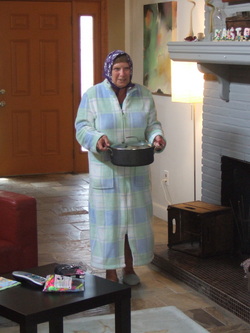
The Rathgeb family agrees: My nephew Brian tends to be a smart-ass. He's proud of the designation, too, so when I started my site and this blog he was quick to send a backhanded compliment that included this line: "One would figure you'd be in the kitchen whipping up some halupki in your house coat."
Well! I wasn't going to take that one lying down. So I whipped up some halupki (stuffed cabbage) and conspired with Brian's sister, who was hosting Easter dinner, to present it to him while wearing a housecoat, slippers and babushka.
The elaborate get-back wasn't hard to pull off, as I do include halupki, pierogi and a couple other family ethnic dishes in my recipe repertoire. Foods, in fact, are really my only connection to my Slovenian-Slovak ancestry. Little is known about the Paulins and the Knotts in the "old country," and I haven't gone barking up the family trees. For me, the halupki connection is good enough.
Nor do I mine the family past for my fiction. This is a bit odd, as there are some great stories and emotional moments: my grandparents getting married in the potato field after years of living together and many children; Aunt Mary's secret marriage; how Aunt Julie saved the life of her future husband in grade school, when he was choking on a toy.
Maybe I will use that material some day, but for now I'm more interested in the old days and the old ways on North Caicos, a home I've adopted.
Why? Well, no one else seems to be doing it. People in the Turks and Caicos are in a push toward modernizing and getting some of the riches they see displayed by their tourists and televisions. Most want to be far removed from such things as bush medicine, conch diving, belief in jumbies and knowledge of slave songs. And the number of people who remember the pride of a boat-launching or the wonder of refrigeration (ice cream!) is quickly dwindling. The research and background I do for short stories is nearly folklore.
Older island women will tell you the same things about local foods. Although there are still lots of people who make peas and rice, conch fritters or johnnycake, the ingredients are store-bought. Few still grind corn, knock a conch or grow and pick pigeon peas.
I'm not very good at the island food traditions, either. But I can listen when old people reminisce, and I've seen for myself the transition from CB radios to smart phones, from "catching a ride" to car rentals.
Here in the U.S., there are plenty of writers who can, have and will evoke the changes in the American dream from immigrant hopes to suburban despair. My only contribution is halupki. In the Turks and Caicos, it's reversed. I'll let Susie Gardiner pass her technique for perfect conch fritters on to her daughters. Instead, I'll listen to her husband talk about the day John Glenn splashed down near Grand Turk, and make it part of a story.
That way, I'll keep one foot in each of my worlds.
Well! I wasn't going to take that one lying down. So I whipped up some halupki (stuffed cabbage) and conspired with Brian's sister, who was hosting Easter dinner, to present it to him while wearing a housecoat, slippers and babushka.
The elaborate get-back wasn't hard to pull off, as I do include halupki, pierogi and a couple other family ethnic dishes in my recipe repertoire. Foods, in fact, are really my only connection to my Slovenian-Slovak ancestry. Little is known about the Paulins and the Knotts in the "old country," and I haven't gone barking up the family trees. For me, the halupki connection is good enough.
Nor do I mine the family past for my fiction. This is a bit odd, as there are some great stories and emotional moments: my grandparents getting married in the potato field after years of living together and many children; Aunt Mary's secret marriage; how Aunt Julie saved the life of her future husband in grade school, when he was choking on a toy.
Maybe I will use that material some day, but for now I'm more interested in the old days and the old ways on North Caicos, a home I've adopted.
Why? Well, no one else seems to be doing it. People in the Turks and Caicos are in a push toward modernizing and getting some of the riches they see displayed by their tourists and televisions. Most want to be far removed from such things as bush medicine, conch diving, belief in jumbies and knowledge of slave songs. And the number of people who remember the pride of a boat-launching or the wonder of refrigeration (ice cream!) is quickly dwindling. The research and background I do for short stories is nearly folklore.
Older island women will tell you the same things about local foods. Although there are still lots of people who make peas and rice, conch fritters or johnnycake, the ingredients are store-bought. Few still grind corn, knock a conch or grow and pick pigeon peas.
I'm not very good at the island food traditions, either. But I can listen when old people reminisce, and I've seen for myself the transition from CB radios to smart phones, from "catching a ride" to car rentals.
Here in the U.S., there are plenty of writers who can, have and will evoke the changes in the American dream from immigrant hopes to suburban despair. My only contribution is halupki. In the Turks and Caicos, it's reversed. I'll let Susie Gardiner pass her technique for perfect conch fritters on to her daughters. Instead, I'll listen to her husband talk about the day John Glenn splashed down near Grand Turk, and make it part of a story.
That way, I'll keep one foot in each of my worlds.
 RSS Feed
RSS Feed